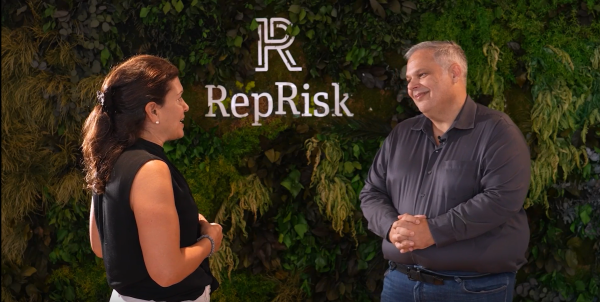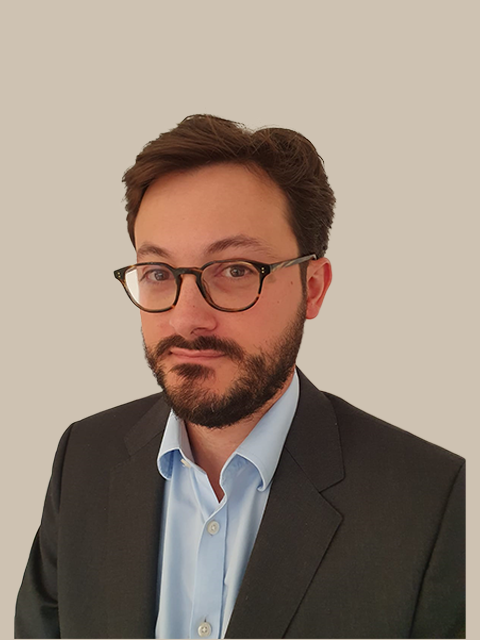# RepRisk interviews Cesar Sanches, Head of Sustainability at B3 S.A.
1. RepRisk: Please provide some details about your specific role at B3 S.A. and the work that you and your team do.
Cesar Sanches: As Head of Sustainability, I am responsible for monitoring ESG megatrends to identify risks and opportunities related to our business. We are committed to adopting and advancing ESG best practices as well as developing ground-breaking solutions in the sustainable finance space.
To that end, our strategy includes three cornerstones. The first one is the adoption of ESG best practices including a robust management system to monitor our performance. The sustainability department works with multidisciplinary teams across the company to identify opportunities for continuous improvement related to ESG aspects. Furthermore, we oversee several projects, activities, and events to improve stakeholder engagement and raise awareness of key issues such as climate change, diversity, inequality, governance, etc.
The second cornerstone is to promote ESG best practices. B3 plays a very important role in galvanizing stakeholders into action. We encourage knowledge sharing with a focus on reporting and best practices to support all stakeholders on their ESG journey.
The third cornerstone is related to ESG products and services. We aim to strengthen our offering to help our clients achieve their strategic goals. To this end, we have developed a portfolio of innovative products and services to facilitate the flow of sustainable capital at scale towards opportunities in line with the Global Goals including ESG-related indices, ESG bonds, decarbonization credits (CBIOs), and so on.
2. RR: B3 S.A. recently launched a new methodology that considers the ESG risk score of companies in the B3 Corporate Sustainability Index (ISE B3), as well as their exposure to each of RepRisk’s 28 ESG Issues. Why do you believe such a high level of transparency is important?
CS: In 2021, we completed the revision of the ISE B3 methodology which included a broad public consultation process. Our goal was to have a more efficient, transparent, and independent methodology.
The new ISE B3 methodology is simpler and more relevant. Companies are asked to answer a specific set of questions depending on their industry and related materiality. Moreover, the new methodology includes a climate change dimension and employs the CDP score to assess companies’ environmental disclosures and performance.
Another important change is the adoption of the Peak RepRisk Index (RRI) for risk assessment, a proxy for the overall reputational risk exposure related to ESG issues of a company.
Using independent data providers such as RepRisk meets investors’ demands for a more consistent, sophisticated, impartial, and transparent methodology.
Now, companies with a Peak RRI greater than 50 points (i.e., high risk exposure) will not be included in the index.
3. RR: Why did you choose RepRisk data for the new ISE B3, or what is the benefit that you believe RepRisk data adds to the algorithm?
CS: As the ESG industry matures, institutional investors are finding an increasingly diverse universe of external research sources. Advancements in natural language processing, machine learning, and artificial intelligence make it possible to collect, analyze, and interpret large amounts of unstructured data from public sources, moving beyond ESG disclosures and reporting.
Hence, we chose to use RepRisk because of its unique ESG risk assessment approach that combines artificial and human intelligence for scale and depth of their dataset as well as daily-updated information.
Screening vast amounts of public sources and stakeholders (i.e., media, blogs, government bodies, regulators, etc.), RepRisk covers both private and public companies in 30 languages, including Portuguese, which allowed us to devise a more robust and transparent methodology for the ISE B3.
4. RR: What role do you think indexes like ISE B3 play in advancing ESG practices in South American market, particularly in Brazil?
CS: The ISE B3 was created in 2005. As the fourth sustainability index in the world and a groundbreaking initiative in Latin America, ISE B3 remains a very important benchmark for ESG investments.
The index is based on a best-in-class methodology and considers several ESG aspects in assessing issues related to human and social capital, corporate governance, senior management, business model and innovation, environmental issues, and climate change.
ISE B3 plays a vital role in supporting companies on their ESG journey. Some companies may use it as a guide since there is a correlation with global standards such as the Global Reporting Initiative (GRI), Sustainability Accounting Standards Board (SASB), B Corp, etc. The number of applications has been growing steadily over the years, which is one indicator showing that sustainability is here to stay.
5. RR: In your view, what are the inherent challenges to ESG integration in passive investing, for yourself as a provider and for your clients?
CS: The modern interpretation of fiduciary duty recognizes that integrating ESG aspects into decision-making does not conflict with financial returns. On the contrary, companies that are responsible in their environmental, social, and corporate governance management are less exposed to risks and are seen as more resilient in the long term.
The information used to develop ESG indices does not come from continuous data flows, relying to some extent on information disclosed in annual and sustainability reports.
On top of that, ESG disclosure often fails to follow typical reporting standards, and when it does, companies have great flexibility in how they present the information, which may lead to non-comparable data. One of the main challenges ESG index providers face nowadays is how to become less reliant on ESG assessments and how to integrate unstructured ESG data into their analyses.
6. RR: What is your forecast for ESG in passive investing and financial decision-making at large?
CS: Information is a very important asset in many industries. This is also true for the world of ESG. The ability to process information that can help identify socio-environmental risks and opportunities is crucial. To unlock the full potential of unstructured information, continuous advancements in machine learning and natural language processing are essential. Another potential opportunity in this space is climate-change related products.
In passive investments, including external sources of ESG information that are not self-reported by companies is often effective in minimizing information discrepancies between companies and market agents, thus improving information reliability in ESG indices.
As more and more investors want to be free to shape their portfolios according to specific investment demands, having a greater plurality of ESG indices presents a new challenge for data and index providers.
Conclusion
B3 S.A., the leading stock exchange in Latin America, is committed to adopting and advancing ESG best practices in the sustainable finance industry. In our latest interview, Cesar Sanches, Head of Sustainability, shared the exchange’s commitment and highlighted the partnership with RepRisk that has resulted in a new methodology for the B3 Corporate Sustainability Index (ISE B3). RepRisk’s unique research approach combines artificial and human intelligence for global company coverage in 30 languages, including Portuguese, and allows B3 to devise a methodology that excludes companies with an overall high reputational risk exposure related to their ESG issues. With the addition of daily-updated ESG risk insights that go beyond annual company reports and disclosures, B3 has addressed one of the biggest data obstacles faced by ESG index providers, and established ISE B3 as an important benchmark for ESG investments.
Bio - Cesar Sanches
Cesar Sanches is Head of Sustainability at B3 S.A., the Brazilian Stock Exchange. He is based in Sao Paulo, SP, Brazil, and spearheads a number of projects and initiatives to promote ESG best practices, sustainable investing, education, reporting as well as develop innovative solutions in data & analytics, carbon markets, natural language processing and machine learning, supporting ground-breaking financial products and indices such as B3’s Corporate Sustainability Index (ISE B3), Carbon Efficient index (ICO2 B3), Corporate Governance Trade Index (IGCT), Novo Mercado Corporate Equity Index (IGC-NM), Special Corporate Governance Stock Index (IGC), Special Tag-Along Stock Index (ITAG), S&P/B3 Brazil ESG, Special Corporate Governance Stock Index (IGCX). Cesar earned his PhD in engineering from the University of Sao Paulo, MSc in Economics from the University of Aberdeen and completed the University of Cambridge Institute for Sustainability Leadership (CISL) Business Sustainability Management course. He also worked on major capital projects across the globe whilst living in Scotland, UK.



